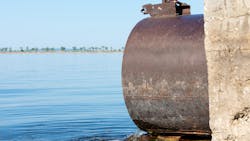Md. approves $10M for wastewater, stormwater infrastructure
The Maryland Board of Public Works announced that it has approved over $10 million in grants and loans for wastewater and stormwater infrastructure.
“These are smart investments to advance our Chesapeake Bay goals, protect public health and reduce flooding risks to Maryland communities,” says Maryland Environment Secretary Horacio Tablada.
The board approved the following projects:
Poolesville Wastewater Treatment Plant Enhanced Nutrient Removal Refinement project
A $7,065,360 Bay Restoration Fund grant to the Town of Poolesville will help fund the planning, design, and construction of denitrification filters and related equipment at the Poolesville Wastewater Treatment Plant.
The project will allow the plant to reduce its nitrogen discharge by 62.5 percent and its phosphorus discharge by 85 percent, significantly reducing the amount of nutrients discharged to Seneca Creek and ultimately the Chesapeake Bay. Enhanced Nutrient Removal upgrades of wastewater treatment plants are a critical component of Maryland’s Chesapeake Bay restoration plan.
Delmar Sewer Replacement Project – Phase I
Funding for the Town of Delmar totaling $2,838,561 – including a $849,552 Water Quality State Revolving Loan Fund loan, a $849,552 grant in the form of forgiveness of a Water Quality State Revolving Loan Fund loan and a $1,139,457 Chesapeake Bay Water Quality Supplemental Assistance grant – will fund a multi-phase project to rehabilitate the town’s sewer system.
The project will reduce inflow and infiltration into the collection system, thereby decreasing the number and severity of sanitary sewer overflows and lowering operating costs for the town. By reducing wet weather flows, the project may also help to alleviate performance problems at the wastewater treatment plant.
Hunters Mill Pond Retrofit project
A $340,294 Comprehensive Flood Management Grant to Wicomico County will help fund a project to renovate and enhance an aging stormwater detention basin serving an unincorporated area of the county.
It will increase the storage capacity of the basin so that it can handle more intense storm events while reducing the risk of downstream flooding. The project will also add water quality treatment features to reduce downstream pollution. The existing facility was built in the 1980’s and serves a drainage area of about 195 acres.
Crisfield Inflow and Infiltration Removal Phase I project
Funding to the City of Crisfield totaling $70,214 – including a $35,107 Water Quality State Revolving Loan Fund loan and a $35,107 grant in the form of forgiveness of a Water Quality State Revolving Loan Fund loan – will help fund repairs throughout the city’s sewage collection system.
The project will reduce inflow and infiltration of water into the sewage collection system and decrease the number and severity of sanitary sewer overflows while lowering operating costs for the city.
